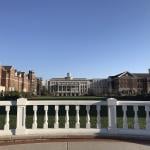 Today marks the death of St. Josemaria Escriva, who was canonized in 2002. The following is from the Vatican website:
Today marks the death of St. Josemaria Escriva, who was canonized in 2002. The following is from the Vatican website:
Josemaría Escrivá was born in Barbastro, Spain, on 9 January 1902, the second of six children born to José Escrivá and María Dolores Albás. Having completed his secondary education, he started his priestly studies at the Seminary of Logroño, passing on, in 1920, to the Seminary of Saragossa, at whose Pontifical University he completed his formation prior to ordination. At his father’s suggestion and with the permission of his ecclesiastical superiors, he also studied Law at the University of Saragossa. His generous and cheerful character and his straightforwardness and calm approach to things won him many friends. His life of piety, respect for discipline and endeavour in study were an example to his fellow seminarians and in 1922, when he was but twenty years of age, he was appointed an inspector or prefect in the Seminary by the Archbishop of Saragossa. During that time he spent many hours praying before the Blessed Sacrament. His spiritual life became deeply rooted in the Eucharist. Each day he would also visit the Basilica of Our Lady of Pilar, asking Mary to request God to show him what He wanted him to do. As he recalled on 2 October 1968: Since I felt those inklings of God’s love, I sought to carry out, within the limits of my smallness, what he expected from this poor instrument. (…) And, with those yearnings, I prayed and prayed and prayed, in constant prayer. I kept on repeating: Domine, ut sit!, Domine, ut videam!, like the poor fellow in the Gospel, who shouted out because God can do everything. Lord, that I may see! Lord, that it may come to be! And I also repeated (…) filled with confidence in my heavenly Mother: Domina, ut sit!, Domina, ut videam! The Blessed Virgin has always helped me to discover her Son’s desires. On 28 March 1925, Josemaría was ordained a priest by Bishop Díaz Gómara in the church of the Seminary of St Charles in Saragossa. Two days later he celebrated his first Solemn Mass in the Holy Chapel of the Basilica of Our Lady of Pilar and on 31 March he moved to Perdiguera, a small country village, where he had been appointed assistant regent to the parish. In April 1927, with the consent of his Archbishop, he took up residence in Madrid to study for his doctorate in Civil Law, a degree which at that time was only granted by the Central University in the Spanish capital. In Madrid, his apostolic zeal soon brought him into contact with a wide variety of people: students, artists, workers, academics, priests. He spent many hours caring for children, and for sick and poverty-stricken people in the outer suburbs of the city. At the same time he taught law to earn a living for himself and his mother and sister and young brother. For a good many years the family were in serious financial difficulties, which they bore with dignity and courage. Our Lord blessed Fr Josemaría with abundant graces, both ordinary and extraordinary. They found a fertile reception in his generous soul and produced much fruit in the service of the Church and souls. Opus Dei was born on 2 October 1928. Blessed Josemaría was spending some days on retreat and, while doing his meditation on some notes regarding the inner motions he had received from God in the previous years, he suddenly saw – to see was the term he always used to describe the foundational experience – the mission the Lord wanted to entrust to him: to open up in the Church a new vocational path, aimed at spreading the quest for holiness and the practice of apostolate through the sanctification of ordinary work in the middle of the world, without changing one’s place. A few months later, on 14 February 1930, God made him understand that Opus Dei was to spread among women also. In 1933, he started a university Centre, the DYA Academy, because he grasped that the world of human knowledge and culture is a key to the evangelisation of society as a whole. In 1934 he published Spiritual Considerations, the first version of The Way. Since then there have been 372 printings of the book in 44 languages and its circulation has passed the four and a half million mark. While Opus Dei was thus taking its first steps, the Spanish Civil War broke out. It was 1936. There were serious outbreaks of religious violence in Madrid. To these Fr Josemaría responded heroically with prayer, penance and apostolic endeavour. It was a time of suffering for the whole Church, but also a time of spiritual and apostolic growth, and for strengthening hope. By 1939, with the war over, the Founder of Opus Dei was able to give new vigour to his apostolic work all over the Spanish peninsula. In particular he mobilised many young university students to take Christ to every area of society and discover the greatness of the Christian calling. At the same time, with his reputation for holiness growing, many Bishops invited him to preach to their clergy and to lay people involved in Catholic organisations. Similar petitions came to him from the superiors of religious orders; he always said yes. In 1941, while he was preaching a retreat to priests in Lerida, in the North of Spain, his mother who had been a great help to him in the apostolates of Opus Dei, died. God also let him become the butt of harsh misunderstandings. The Bishop of Madrid, Bishop Eijo y Garay gave him his fullest backing and granted the first canonical approval to Opus Dei. Blessed Josemaría accepted these difficulties with a prayerful and cheerful attitude, aware that all those desiring to live piously in Christ Jesus will meet persecution (2 Tim 3:12) and he recommended his spiritual children, in the face of these attacks, to forgive ungrudgingly: don’t answer back, but pray, work and smile. In 1943, through a new foundational grace he received while celebrating Holy Mass, there came to birth – within Opus Dei – the Priestly Society of the Holy Cross, in which priests proceeding from the faithful of Opus Dei could be incardinated. The fact of all the faithful of Opus Dei, both laity and priests, belonging fully to Opus Dei, with both laity and priests cooperating organically in its apostolates, is a feature of the foundational charism, which the Church confirmed in 1982, when giving Opus Dei its definitive status in Church Law as a Personal Prelature. On 25 June 1944 three engineers were ordained to the priesthood. One of them was Alvaro del Portillo, who would eventually succeed the Founder as the head of Opus Dei. In the years that followed, close on a thousand laymen of Opus Dei reached the priesthood at the encouragement of Blessed Josemaría. The Priestly Society of the Holy Cross, which is intrinsically united to the Prelature of Opus Dei, also carries out, in close harmony with the Pastors of the local Churches, activities of spiritual formation for diocesan priests and candidates to the priesthood. Diocesan priests too may belong to the Priestly Society of the Holy Cross, while maintaining unchanged their status as clergy of their respective dioceses.
As soon as the end of the world war was in sight, Blessed Josemaría began to prepare apostolic work in other countries, because, as he pointed out, Jesus wants his Work from the outset to have a universal, Catholic heart. In 1946 he moved to Rome, in order to obtain papal recognition for Opus Dei. On 24 February 1947, Pius XII granted Opus Dei the decretum laudis, or decree of praise; and three years later, on 16 June 1950, the Church’s definitive approval. Since then it has been possible to admit as Cooperators of Opus Dei men and women who are not Catholic and not even Christian, but who wish to help its apostolic works, with their work, alms and prayer.
The headquarters of Opus Dei were fixed in Rome, to emphasise even more clearly the aspiration which is the guiding force of all its work, to serve the Church as the Church wishes to be served, in close union with the see of Peter and the hierarchy of the Church. On several occasions, Pius XII and John XXIII sent Blessed Josemaría expressions of their affection and esteem; Paul VI wrote to him in 1964 describing Opus Dei as “a living expression of the perennial youthfulness of the Church”.
This stage too of the life of the Founder of Opus Dei was characterised by all kinds of trials. Not only was his health affected by many sufferings (for more than ten years he had a serious form of diabetes, from which he was miraculously cured in 1954), but also there were financial hardships and the difficulties arising from the expansion of the apostolic works worldwide. Nevertheless, he kept smiling throughout, because True virtue is not sad or disagreeable, but pleasantly cheerful. His permanent good humour was a constant witness to his unconditional love for God’s will.
The world is little, when Love is great: his desire to flood the earth with the light of Christ led him to follow up the calls that many Bishops made to him from all over the world, asking Opus Dei to help them in the work of evangelisation with its apostolates. Many varied projects were undertaken: colleges to impart professional training, schools for agricultural workers, universities, primary and secondary schools, hospitals and medical centres, etc. These activities, which he often compared to a shoreless sea, originate at the initiative of ordinary Christians who seek to meet specific local needs with a lay mentality and a professional approach. They are open to people of all races, religions and social backgrounds, because their unmistakably Christian outlook is always matched by a deep respect for the freedom of consciences.
When John XXIII announced his decision to call an Ecumenical Council, Blessed Josemaría began to pray and get others to pray for the happy outcome of this great initiative of the Second Vatican Ecumenical Council, as he wrote in a letter in 1962. As a result of the deliberations of the Council, the Church’s solemn Magisterium was to confirm fundamental aspects of the spirit of Opus Dei, such as the universal call to holiness; professional work as a means to holiness and apostolate; the value and lawful limits of Christian freedom in temporal affairs; and the Holy Mass as the centre and root of the interior life. Blessed Josemaría met numerous Council Fathers and experts, who saw him as a forerunner of many of the master lines of the Second Vatican Council. Profoundly identified with the Council’s teaching, he diligently fostered its implementation through the formative activities of Opus Dei all over the world.
Blessed Josemaría preached constantly that interior life is more important than organising activities. In The Way he wrote that These world crises are crises of saints. He insisted that holiness always requires prayer, work and apostolate to be intertwined in what he called a unity of life, and practised this himself with cheerful perseverance. He was utterly convinced that in order to attain sanctity through daily work, one needs to struggle to be a soul of prayer, of deep inner life. When a person lives this way, everything becomes prayer, everything can and ought to lead us to God, feeding our constant contact with Him, from morning till night. Every kind of work can become prayer, and every kind of work, become prayer, turns into apostolate.
On 26 June 1975, at midday, Blessed Josemaría died in his workroom, of a cardiac arrest, before a picture of Our Lady which received his last glance. At the time, Opus Dei was present in all five continents, with over 60,000 members from 80 nationalities. His books of spirituality (The Way, Holy Rosary, Conversations with Mgr Escrivá, Christ is Passing By, Friends of God, Love for the Church, The Way of the Cross, Furrow, The Forge) have reached millions of copies.











